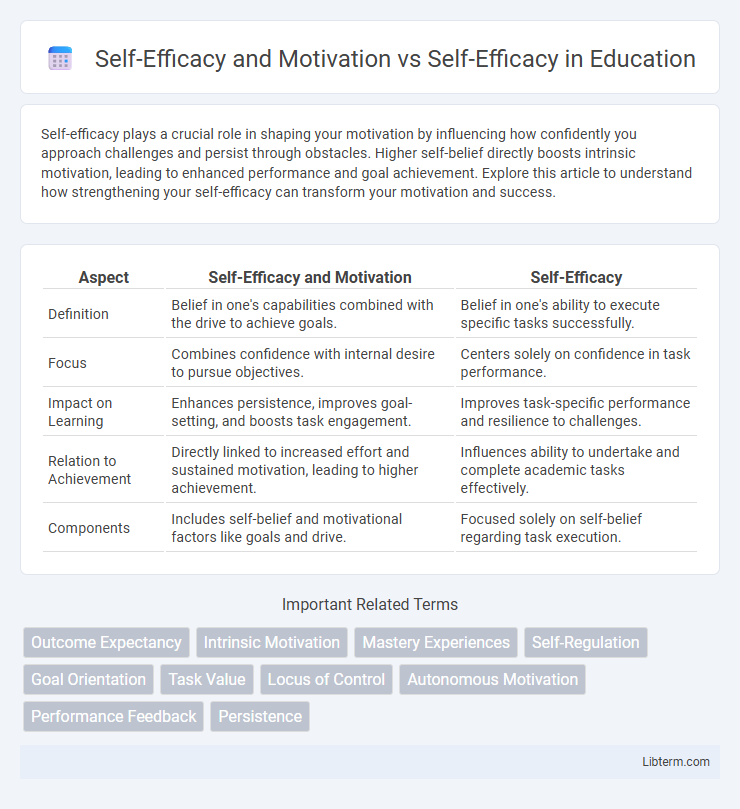Self-efficacy plays a crucial role in shaping your motivation by influencing how confidently you approach challenges and persist through obstacles. Higher self-belief directly boosts intrinsic motivation, leading to enhanced performance and goal achievement. Explore this article to understand how strengthening your self-efficacy can transform your motivation and success.
Table of Comparison
| Aspect | Self-Efficacy and Motivation | Self-Efficacy |
|---|---|---|
| Definition | Belief in one's capabilities combined with the drive to achieve goals. | Belief in one's ability to execute specific tasks successfully. |
| Focus | Combines confidence with internal desire to pursue objectives. | Centers solely on confidence in task performance. |
| Impact on Learning | Enhances persistence, improves goal-setting, and boosts task engagement. | Improves task-specific performance and resilience to challenges. |
| Relation to Achievement | Directly linked to increased effort and sustained motivation, leading to higher achievement. | Influences ability to undertake and complete academic tasks effectively. |
| Components | Includes self-belief and motivational factors like goals and drive. | Focused solely on self-belief regarding task execution. |
Defining Self-Efficacy: Core Concepts
Self-efficacy refers to an individual's belief in their ability to execute specific tasks successfully, influencing their motivation and behavior. It is a core concept in psychology that shapes how people approach goals, challenges, and perseverance. High self-efficacy enhances motivation by fostering confidence, while low self-efficacy can hinder effort and persistence.
The Role of Motivation in Personal Achievement
Motivation drives the persistence and effort individuals invest in tasks, directly influencing the development and strengthening of self-efficacy beliefs. High levels of motivation enhance goal-setting and resilience, enabling individuals to overcome obstacles and achieve personal success. Research indicates that motivation acts as a crucial mediator between self-efficacy and actual performance outcomes in various achievement domains.
Interplay Between Self-Efficacy and Motivation
Self-efficacy significantly influences intrinsic motivation by shaping an individual's belief in their capability to achieve goals, which in turn drives persistent effort and resilience. High self-efficacy enhances task-specific motivation, resulting in increased engagement and improved performance outcomes across educational, professional, and athletic domains. The dynamic interplay between self-efficacy and motivation creates a feedback loop where success reinforces confidence, further motivating sustained goal-directed behavior.
Self-Efficacy vs Self-Motivation: Key Differences
Self-efficacy refers to an individual's belief in their ability to execute tasks and achieve goals, directly impacting performance and resilience. Self-motivation involves the internal drive to initiate and sustain goal-oriented behavior, influenced by personal values and incentives. The key difference lies in self-efficacy being a judgment of capability, while self-motivation is the force that propels action toward those goals.
How Self-Efficacy Influences Motivation
Self-efficacy significantly influences motivation by shaping individuals' beliefs in their capability to execute tasks, which directly impacts their goal-setting and persistence. Higher self-efficacy enhances intrinsic motivation, leading to increased effort and resilience in the face of challenges. Thus, self-efficacy serves as a critical predictor of motivated behavior and task engagement.
Building Self-Efficacy for Enhanced Motivation
Building self-efficacy is crucial for enhancing motivation, as strong self-belief directly influences goal-setting, persistence, and resilience in tasks. Techniques such as mastering small challenges, observational learning, and positive reinforcement effectively increase self-efficacy levels, creating a feedback loop that amplifies intrinsic motivation. Research consistently shows that individuals with high self-efficacy are more likely to engage in proactive behaviors and maintain sustained effort toward their objectives.
Psychological Theories Supporting Self-Efficacy and Motivation
Psychological theories such as Bandura's Social Cognitive Theory emphasize the role of self-efficacy as a critical determinant of motivation, suggesting individuals with high self-efficacy are more likely to set challenging goals and persist in the face of obstacles. The Theory of Planned Behavior also highlights self-efficacy by associating perceived behavioral control with the motivation to perform specific actions. Motivation theories like Deci and Ryan's Self-Determination Theory complement these perspectives by linking intrinsic motivation to self-efficacy, thereby enhancing sustained engagement and performance.
Practical Strategies to Boost Self-Efficacy and Motivation
Boosting self-efficacy and motivation involves practical strategies such as setting achievable goals, celebrating small successes, and using positive self-talk to reinforce confidence. Incorporating mastery experiences, social modeling, and constructive feedback strengthens belief in one's abilities while maintaining intrinsic motivation through purpose and interest. Regularly reflecting on progress and adjusting challenges ensures sustained engagement and growth in both self-efficacy and motivation.
Measuring Self-Efficacy and Motivational Levels
Measuring self-efficacy involves assessing individuals' confidence in their ability to perform specific tasks, typically using scales such as the General Self-Efficacy Scale or task-specific questionnaires. Motivational levels are often evaluated through instruments like the Motivational Trait Questionnaire or the Intrinsic Motivation Inventory, which gauge the drive, persistence, and goal orientation behind actions. Comparing these measurements highlights how self-efficacy reflects belief in capability, while motivation captures the underlying reasons for initiating and sustaining behaviors.
Impact of Self-Efficacy and Motivation on Goal Setting
Self-efficacy and motivation play crucial roles in effective goal setting by enhancing an individual's belief in their ability to succeed and sustaining their drive to achieve objectives. High self-efficacy increases perseverance and resilience when facing challenges, while intrinsic motivation ensures goals align with personal values, boosting commitment and performance. This dynamic interaction significantly improves goal specificity, difficulty management, and overall success rates in various domains such as education, sports, and workplace productivity.
Self-Efficacy and Motivation Infographic

 libterm.com
libterm.com